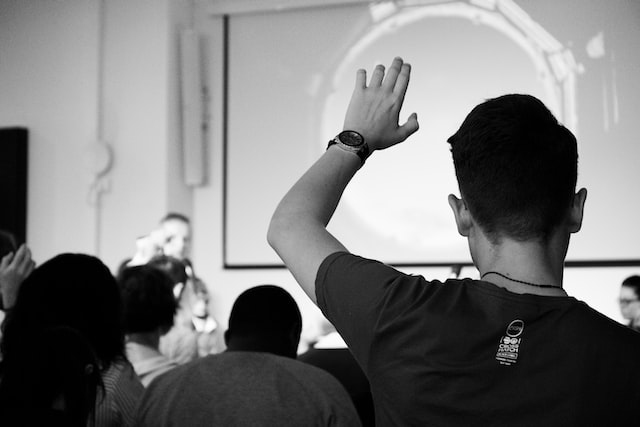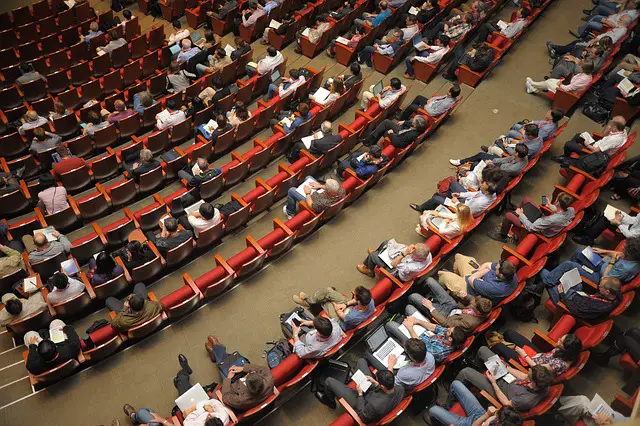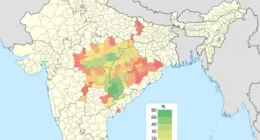Public forums and panel discussions are both important ways of exchanging ideas and opinions. Public forums are generally more open-ended conversations with a variety of participants while panel discussions involve fewer people who have expertise in the topic being discussed.
Public Forum
(Photo by Felicia Buitenwerf on Unsplash )

A public forum is a space, physical or virtual, where members of the public can gather to express their views, share information, and participate in discussions and debates. Public forums can take many forms, including town hall meetings, public rallies, online discussion boards, and social media platforms. They are open to anyone and are typically designed to be inclusive and accessible to all members of the community. The goal of a public forum is often to foster open and informed discourse, and to provide a platform for diverse perspectives and ideas to be shared and considered.
Panel Discussion
A panel discussion is a public forum in which a group of experts are invited to discuss a particular topic. The panelists may be from different organizations or fields, and they may have different perspectives on the issue at hand. A moderator guides the discussion, ensuring that all panelists have a chance to speak and that the discussion stays on track. Panel discussions can be used to educate an audience on a particular topic, or to generate new ideas and solutions to problems.
What is the difference between group discussion and panel discussion?
Group discussion is a discussion between two or more people in which each person has an equal opportunity to express his or her own ideas and opinions. Panel discussion is a discussion between two or more people in which each person takes turns speaking.
What is difference between a panel discussion and a symposium?
A panel discussion is a forum in which a group of experts are asked questions by a moderator and the audience. A symposium is a meeting or conference at which several experts deliver speeches on a particular subject.
Pros and cons of each
Public forums and panel discussions are both types of events where experts discuss a topic with an audience, but there are some key differences between the two. Public forums tend to be more informal, with a focus on open discussion and debate between the panelists. Panel discussions, on the other hand, tend to be more structured, with each panelist taking turns speaking on the topic.
So which type of event is right for you? Here are some pros and cons of each:


When to use each method
Public forums are open to anyone who wants to join the discussion. This makes them ideal for large groups or for discussions on controversial topics. However, public forums can be chaotic and lack structure.
Panel discussions, on the other hand, are more structured. A panel of experts is invited to discuss a specific topic in front of an audience. This format is great for exploring different points of view on a complex issue. However, panel discussions can be less democratic than public forums, since only a few people have a voice in the discussion.
How to facilitate a public forum or panel discussion
It’s important to be clear about the purpose of the event. What topics will be covered? Who is the audience? What is the goal of the event? Once you have a good understanding of the overall objective, you can start to plan out the details.
When it comes to logistics, a public forum is typically more open-ended than a panel discussion. That means that you’ll need to allow for more time for questions and discussion from the audience. A panel discussion, on the other hand, is more focused and structured. The panelists will each have a specific role to play in leading the discussion.
Facilitating a successful public forum or panel discussion takes careful planning and preparation. But with some forethought and consideration, you can ensure that your event runs smoothly and achieves its objectives.
What are the three types of panel discussion?
A panel discussion is a controlled conversation between a group of people, usually expert panelists, conducted in front of an audience. The moderator or host guides the panelists through a set of questions on a particular topic, allowing the panelists to share their perspectives and knowledge on the subject.
There are three common types of panel discussions:
- The Roundtable: In this type of panel discussion, the moderator or host and the panelists sit at a table facing the audience. This arrangement allows for more informal conversation and engagement between the panelists and the audience.
- The Interview: In this type of panel discussion, the moderator or host interviews the panelists one-by-one in front of the audience. This format allows for more in-depth exploration of each panelist’s thoughts and experiences on the topic.
- The Debate: In this type of panel discussion, the moderator or host poses a question to the panelists and then allows them to debate amongst themselves in front of the audience. This format can be more lively and controversial, providing different perspectives on a single issue.
What are 4 types of discussion?
- Formal debates
- Informal debates
- Panels
- Public forums
What are the features of panel discussion?
A panel discussion is a type of public forum in which a group of experts discuss a particular topic. Panel discussions are usually moderated by a moderator who guides the discussion and ensures that all panelists have an opportunity to speak.
Panel discussions can be used to provide information, generate new ideas, or simply to entertain an audience. When used to provide information, panel discussions typically feature experts who share their knowledge on a particular topic. When used to generate new ideas, panel discussions often involve brainstorming and allow for open dialogue between panelists. And when used for entertainment, panel discussions can be light-hearted and humorous.
No matter the purpose, panel discussions typically involve some level of interaction between panelists and the audience. This interaction can take the form of questions and answers, discussion among panelists, or even debate.
How do you introduce a panel discussion?
When introducing a panel discussion, it is important to first introduce the topic that will be discussed. Next, you will want to introduce each of the panelists. Include their name, title, and any relevant information about them. Finally, give a brief overview of what the panel discussion will entail.
What is the advantage of panel discussion?
There are several advantages to panel discussions over public forums.
First, panel discussions tend to be more organized and focused. This is because the participants are typically chosen ahead of time, and they are given specific topics to discuss. This can make for a more productive and informative discussion.
Second, panel discussions often allow for more back-and-forth between the participants. This can create a more dynamic discussion and help the participants to better understand each other’s points of view.
Third, panel discussions can be recorded and shared with a wider audience. This is especially beneficial if the discussion is particularly enlightening or informative. recordings of public forums, on the other hand, are typically not made or distributed.
Overall, panel discussions offer a number of advantages over public forums. They tend to be more focused and organized, allow for more back-and-forth between participants, and can be recorded and shared with a wider audience. If you are looking for an engaging way to learn about a particular topic or issue, a panel discussion may be the perfect format for you.
What is the advantage of a public forum?
When most people think of a public forum, they picture a large room with a podium and microphone set up at the front. This is the classic image of a public forum, but it is not the only type of public forum. There are also virtual public forums, which are forums that take place online.
The advantage of a public forum is that it allows for open discussion between all participants. In a panel discussion, there is typically a moderator who controls the flow of conversation. This can limit the discussions that take place and prevent some topics from being addressed. In a public forum, anyone can start a discussion or join in on an existing one. This makes for a more democratic conversation where everyone has an equal say.
What are examples of public forums?
(Photo by Chris Montgomery on Unsplash )

A public forum is a place where people can gather to discuss various topics. This can be either online or in person. Some examples of public forums are:
- Social media platforms (Facebook, Twitter, Reddit, etc.)
- Blogs and forums (such as this one!)
- News websites and comment sections
- Public meetings or hearings
Basically, anywhere that people can come together and share their thoughts on a subject can be considered a public forum. These are just a few examples – there are many more out there!
Why are public forums used?
There are many reasons for why public forums are used. Some of these reasons include: to engage with the community, to hear different perspectives, to learn from others, and to make decisions.
Public forums offer a unique opportunity for engagement between citizens and their government. They provide a space for people to share their perspectives and ideas on issues that matter to them, and they offer government officials a chance to hear directly from those they serve.
In addition to being a valuable tool for government-citizen engagement, public forums can also be a great learning opportunity for both groups. For citizens, attending a public forum can be a way to learn about the inner workings of their government and the issues that it is facing. For government officials, public forums can provide an opportunity to gain insights into how members of the community are experiencing an issue and what their concerns are.
Finally, public forums can also be used as a tool for making decisions. By bringing together different stakeholders and getting input from all sides, decision-makers can ensure that they are taking into account the needs and perspectives of those who will be affected by their decisions.
What are the different types of forums?
There are many different types of forums, each with its own strengths and weaknesses. Here are some of the most popular types:
- Public Forums: These are forums where anyone can participate. They’re often used to generate ideas or discuss controversial topics.
- Private Forums: Only certain people are allowed to participate in these forums. They’re often used for sensitive topics or to get feedback from a specific group of people.
- Panel Discussions: These are forums where a group of experts discuss a topic. They’re often used to provide information or generate ideas.
- Moderated Forums: In these forums, a moderator controls who can participate and what can be discussed. They’re often used to keep discussions on track or to prevent certain topics from being discussed.
What are the components of a forum?
A forum is a discussion board or space where users can post questions, comments and opinions on a given topic. A forum might be moderated by an expert panel or simply left open for public discussion. The key difference between a public forum and panel discussion is that a public forum gives all members of the audience an equal opportunity to share their thoughts and ideas, while a panel discussion limits the conversation to a pre-selected group of experts.
How to design a forum?
When designing a forum, there are a few key things to keep in mind. First, you need to decide what type of forum you want to create. There are two main types of forums: public forums and panel discussion.
Public forums are open to anyone who wants to participate. Anyone can join in the discussion and share their thoughts. Panel discussions, on the other hand, are more intimate affairs. They usually involve a smaller group of people, often experts on the topic being discussed.
Once you’ve decided on the type of forum you want to create, you need to come up with a list of topics for discussion. This can be anything from current events to controversial topics. Once you have your list of topics, you need to find people who are willing to participate in the discussion.
For public forums, this can be as simple as opening up the floor to anyone who wants to join in. For panel discussions, you may need to invite people ahead of time so that they can prepare for the discussion.
Once you have your participants lined up, it’s time to start planning the actual event. You’ll need to choose a date, time, and location for the discussion. You should also decide how long you want the discussion to last.
And finally, you’ll need to come up with some ground rules for participation so that everyone knows what is expected of them.
What are the rules of a forum?
The rules of a forum vary depending on the specific forum in question. However, there are some general guidelines that apply to most forums. First and foremost, participants in a forum must be respectful of one another. This means no personal attacks or inflammatory language. Secondly, participants should stay on topic as much as possible. If the discussion strays too far off course, it may be difficult for others to follow. Finally, participants should avoid spamming the forum with irrelevant postings or excessive self-promotion.









